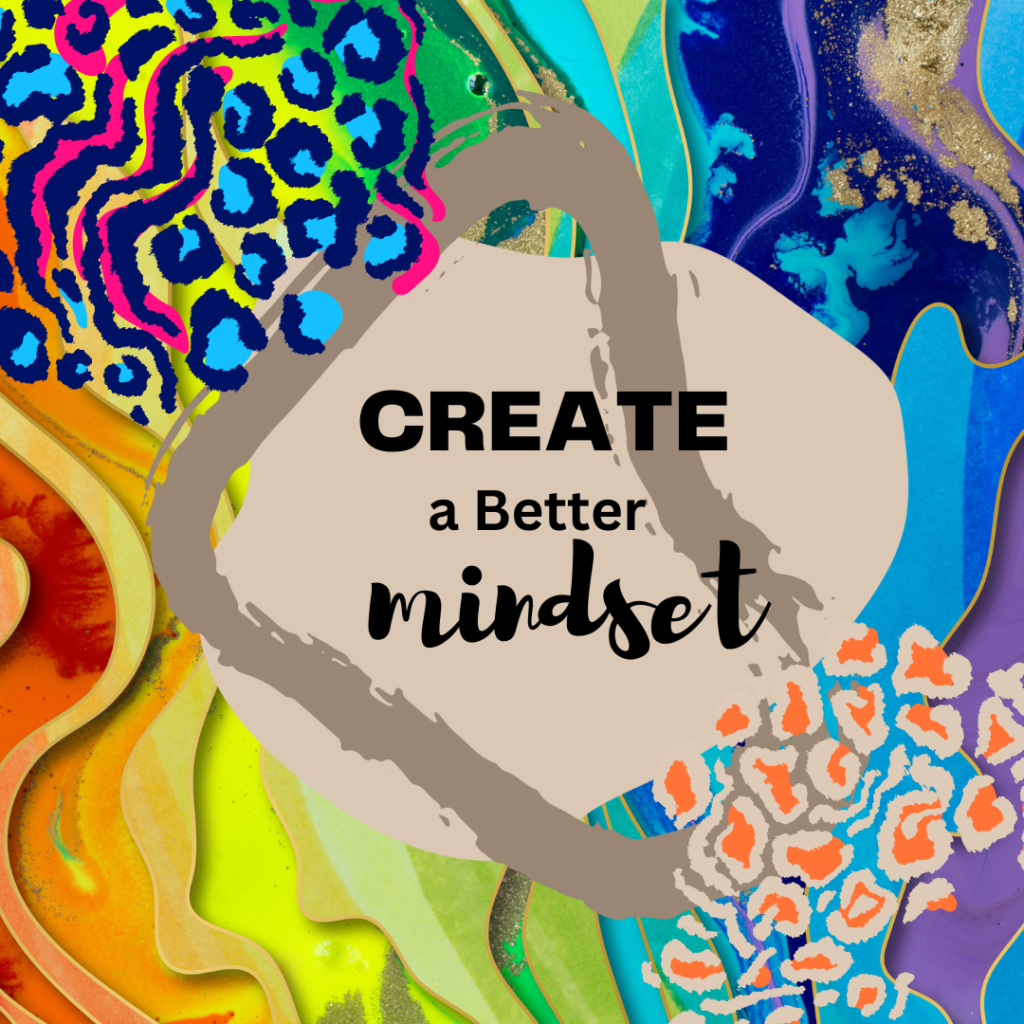Your mindset habits are more than just fleeting thoughts—they are a set of deeply ingrained beliefs that shape how you perceive the world and yourself. These beliefs influence your thoughts, emotions, and behaviors in any situation. Developing strong mindset habits can be the catalyst for personal development and achieving your goals.
In this article, we cover 10 powerful mindset habits that you can start cultivating today to transform your life.
These mindset habits will help you create a better mindset, which will empower you to unleash your full potential and lead a more rewarding life.

The Power of Mindsets + Habits
Your mindset is the key to your success. When you see yourself as a capable human being that can learn, grow, and develop, the world opens up to you.
You see, your beliefs shape your mindset in powerful ways. They influence how you perceive yourself and the world around you.
Beliefs can either limit us or empower us to achieve greatness.
If you constantly tell yourself that you’re not good at something, you’ll probably avoid it altogether. But by changing these beliefs into positive ones—like telling yourself “I can improve with practice”—you shift your entire approach to challenges and learning.
The Influence of Beliefs on Abilities
Believing in your potential helps you take on new challenges with confidence and determination. When you understand you can develop through effort and practice, you are more likely to take changes and step outside your comfort zone. This belief empowers you to embrace challenges as opportunities for growth rather than obstacles to overcome.
Cultivating Powerful Mindset Habits
Let’s review the 10 mindset habits that you can start cultivating today to transform your life.
10 Mindset Habits That Will Transform Your Life
There’s no sense in delaying. Here are the 10 mindset habits that will transform your life.
- Believe in your ability to learn and improve.
- Cultivate a mindset of appreciation and focus on the positive aspects of your life.
- See setbacks as stepping stones to success, and learn from them.
- Define what you want to achieve and create a roadmap to reach your objectives.
- Treat yourself with kindness and understanding when facing challenges or making mistakes.
- Choose to spend time with supportive individuals who uplift and inspire you.
- Use the power of your imagination to envision your goals and manifest success.
- Turn your dreams into reality by taking consistent, purposeful action towards your goals.
- Cultivate resilience.
- Commit yourself to lifelong learning and personal development.
By cultivating these mindset habits, you can unleash your full potential and lead a more rewarding life.
Remember, you can shape and develop your mindset through conscious effort and practice. Start today by adopting these powerful mindset habits and watch how they transform your life.
Let’s examine these 10 mindset habits.
How Beliefs Shape our Mindset

We know our beliefs shape our perception and emotions. Our beliefs act as the lens through which we view the world, influencing how we interpret events, situations, and interactions. They can have a profound impact on our mindset, shaping our attitudes and behaviors.
Beliefs About Ourselves
The beliefs we hold about ourselves are influential in shaping our mindset. If we believe we are capable and deserving of success, we are more likely to approach challenges with confidence and resilience. If we hold negative beliefs about ourselves, such as thinking we are not smart enough or talented enough, it can hinder our growth and limit our potential.
Our experiences also shape our beliefs, and subsequently, our mindset. Positive experiences where we have achieved success or overcome challenges can reinforce a growth mindset. Conversely, negative experiences where we have faced failure or setbacks can lead to self-doubt and a fixed mindset. It is important to recognize that your experiences do not define you, but can influence your beliefs if you let them.
Social Influences on Beliefs
The beliefs of those around us, such as family members, friends, teachers, and mentors, can also affect our mindset. If the people in our lives consistently encourage us to believe in ourselves and embrace growth and learning, it can strengthen our own belief in our abilities.
Conversely, if individuals in our lives promote fixed mindsets or discourage us from taking risks, it can hinder our mindset development.
Cognitive Biases
Our beliefs are not always based on objective reality. Cognitive biases, such as confirmation bias and self-serving bias, can distort our perception and reinforce existing beliefs.
Confirmation bias, for example, leads us to seek information that confirms our preexisting beliefs while ignoring or dismissing contradictory evidence. Being aware of these biases can help us challenge and expand our beliefs.
In conclusion, our beliefs have a profound influence on our mindset. They shape how we perceive ourselves, our abilities, and the world. By understanding the power of beliefs and actively challenging and reshaping them, we can cultivate a growth mindset that empowers us to reach our full potential.
The Power of Mindset Habits
The power of habits ties into this beautifully. Building small, consistent habits aligned with a growth mindset reinforces your belief in self-improvement.
Whether it’s reading daily, practicing gratitude, or setting mini-goals, these habits create a positive feedback loop that strengthens a growth-oriented approach to life.
How to Create Better Mindset Habits
Below are some strategies to help you create better mindset habits:
Start Small
Begin by choosing one habit that aligns with your growth mindset goals. It could be something as simple as spending 10 minutes each morning practicing mindfulness or writing three things you’re grateful for.
Be Consistent
Consistency is the key to building habits. Set a specific time or trigger for your habit and commit to doing it every day. For example, if you want to develop a visualization habit, designate a specific time each day, such as before bed or during your lunch break.
Track Your Progress
Keep track of your habit-building journey to stay motivated and accountable. Use a habit tracker app or simply mark off each day on a calendar when you successfully complete your habit. Seeing your progress visually can be incredibly rewarding and encouraging.
Make It Enjoyable
Make your habit enjoyable so that you look forward to doing it. If you’re trying to incorporate exercise into your routine, choose an activity that you genuinely enjoy, whether it’s dancing, hiking, or playing a sport. When you enjoy the process, it becomes easier to stick with the habit.
Stay Flexible
Life can be unpredictable, and there may be days when it’s challenging to maintain your habit. In such situations, be flexible and adaptable. If you can’t do your usual habit at the scheduled time, find an alternative time later in the day or change the activity slightly so that you can still engage with it.
Find an Accountability Partner
Consider finding an accountability partner who shares similar mindset goals. You can check in with each other regularly, share progress, and provide support and encouragement. Having someone to hold you accountable can significantly increase your chances of sticking to your habits.
Remember, building mindset habits takes time and effort. Be patient with yourself and celebrate even the smallest victories along the way.
With consistent practice, these habits will become ingrained in your daily life, reinforcing your mindset and helping you navigate challenges with resilience and determination.
Mindset Habits: Cultivating Resilience
Developing a resilient mindset is essential for bouncing back stronger from setbacks. This involves viewing challenges not as insurmountable obstacles, but as opportunities for growth. Adopting this perspective can transform your outlook and help you tackle difficulties head-on.
Here’s how to cultivate resilience:
Shift Your Perspective on Failure
- Rather than seeing failure as a dead-end, view it as a learning experience.
- Understand that each setback provides valuable feedback and insights that can fuel future success.
- Remember that every successful person has faced failure at some point; it’s their resilience that made the difference.
Build Emotional Resilience
- Practice self-reflection to understand your emotional responses to challenges.
- Develop strategies, such as deep breathing or journaling, to manage stress and maintain emotional balance.
- Surround yourself with supportive individuals who encourage and uplift you during tough times.
Embrace a Problem-Solving Attitude
- Break down problems into smaller, manageable parts.
- Focus on actionable steps rather than being overwhelmed by the entire challenge.
- Celebrate small victories along the way to maintain motivation.
You’ll see challenges as stepping stones rather than roadblocks when you implement these practices.

Mindset Habit: Embracing Change and Uncertainty
Having a flexible mindset is crucial for navigating change and uncertainty. It allows you to respond rather than react, making thoughtful decisions instead of getting stuck in fear or resistance.
Strategies for Embracing Change
Step out of your comfort zone: Challenge yourself regularly by doing things that push your boundaries. Whether it’s taking on additional responsibilities at work or trying a new hobby, these experiences build confidence and adaptability.
Mind your mindset: View changes as opportunities to learn and grow. When faced with uncertainty, ask yourself what you can learn from the situation and how it can contribute to your personal development. Guard against faulty thinking.
Stay present: Practice mindfulness to keep your focus on the present moment rather than worrying about the future. This can help reduce anxiety and make it easier to handle unexpected changes.
Embracing uncertainty doesn’t mean being reckless; it means being prepared to adapt and thrive, no matter what comes your way.
The Power of Self-Compassion in Overcoming Challenges
Being kind to yourself during difficult times is not just a pleasant idea; it’s essential for maintaining mental and emotional well-being.
A self-compassion mindset allows you to treat yourself with the same kindness and understanding that you would offer a close friend.
Practical Ways to Cultivate a Self-Compassion Mindset
Recognize when you’re being overly critical of yourself. Instead of harsh self-judgment, acknowledge your feelings without attaching negative labels.
In addition, use affirmations to remind yourself of your worth and capabilities. Phrases like “I am enough” or “I am doing my best” can shift your mindset towards self-compassion.
Last, dedicate time each day to activities that nourish your soul—whether it’s a walk in nature, reading a book, or practicing yoga.
Making Self-Compassion a Habit
- Spend a few minutes each day reflecting on what went well and what you’re grateful for, rather than focusing solely on your shortcomings.
- Learn to say no when necessary. Protecting your time and energy is crucial for maintaining a compassionate attitude towards yourself.
- Surround yourself with people who uplift and encourage you. Their positive influence can reinforce your own self-compassionate habits.
Creating a habit of self-compassion can transform how you navigate challenges, leading to greater resilience and personal growth.
Surrounding Yourself with Positive Influences
Our environment significantly affects our mindset and overall well-being. A positive environment acts as a mindset support system, fostering growth and resilience.
Creating a Positive Space
- Declutter Your Physical Space: A tidy, organized space can reduce stress and improve focus. I know this all too well. When my office is organized, I feel better.
- Incorporate Uplifting Elements: Decorate with items that inspire you, like motivational quotes or personal mementos.
- Limit Negative Influences: Minimize contact with people or media that brings negativity into your life. There are some news channels that I avoid completely.
Building a Supportive Network
- Surround Yourself with Positive People: Engage with those who uplift and encourage you. Their positive energy can be contagious.
- Seek Mentors and Role Models: Learn from individuals who exemplify the mindset you aspire to cultivate.
- Join Like-Minded Communities: Take part in groups or clubs that share your interests and goals.
By deliberately creating a positive environment, you establish the perfect conditions for a better mindset.
The Habit of Mindful Living
We can’t talk about mindset habits and not talk about mindfulness. Cultivating a mindfulness mindset can transform how you experience daily life. Mindfulness helps you stay present and fosters a non-judgmental attitude towards your thoughts and emotions.
Benefits of Mindfulness
Living mindfully offers many benefits that can enhance your overall well-being. By cultivating a mindfulness mindset, you can experience the following advantages:
Mindfulness keeps you anchored in the present moment, helping you let go of worries about the past or future. By focusing on the present, you can reduce stress and anxiety, allowing for a calmer and more peaceful state of mind.
When faced with setbacks or difficult emotions, mindfulness can also help you bounce back faster. When you develop an awareness of your thoughts and emotions without judgment, you can build emotional resilience and better cope with challenging situations.
Greater Mental Clarity
Practicing mindfulness allows you to observe your thoughts and emotions without getting caught up in them. This increased clarity of mind enables better decision-making, problem-solving, and overall cognitive functioning.
Mindfulness also cultivates a non-judgmental attitude towards your thoughts, emotions, and experiences. Self-awareness helps you gain a deeper understanding of yourself, your triggers, and your patterns of behavior. This self-awareness can lead to personal growth and positive change.
Improved Physical Health
In addition, research suggests that mindfulness practices can have a positive impact on physical health. Studies have linked regular mindfulness meditation to reduced blood pressure, improved immune function, better sleep quality, and decreased pain perception.
Better Relationships
Being fully present in your interactions with others can improve the quality of your relationships. Mindfulness helps you listen attentively, empathize with others, and respond thoughtfully rather than reactively. This fosters deeper connections and more fulfilling relationships.
Improved Concentration
By training your mind to stay focused on the present moment, mindfulness can improve concentration and attention span. With enhanced focus comes increased productivity and efficiency in both personal and professional endeavors.
Greater Compassion and Kindness
Mindfulness encourages a compassionate and kind mindset towards yourself and others. When you practice self-compassion, you reduce self-criticism and enhance your ability to show empathy and kindness to those around you.
Incorporating mindfulness into your daily life can have profound effects on your overall well-being, allowing you to live a more fulfilling and balanced existence.
Practical Tips for Integrating Mindfulness
1. Start Your Day with Intention: Spend a few minutes each morning focusing on your breath and setting an intention for the day.
For example, “I will be okay today no matter what comes my way” or “Today will be a good day.”
2. Mindful Eating: Pay attention to the taste, texture, and smell of your food, savoring each bite.
3. Daily Meditation: Even 5-10 minutes of meditation can make a significant difference in your mindfulness practice.
Integrating these habits into your routine helps nurture a mindfulness mindset, enhancing your overall well-being.

Setting Intentional Mindset Habits
Building intentional habits is a powerful way to develop your mindset and achieve your goals. When you set habits that align with your goals, you foster a positive and productive mindset.
Here’s how you can start incorporating intentional habits into your daily life:
- Clearly outline what you want to achieve. These are your mindset goals, the stepping stones to personal growth.
- Make sure the habits you form support these goals. For example, if you aim to improve your physical health, consider setting a habit of daily exercise.
- Stick to your new habits consistently. This reinforces your commitment and helps embed them into your routine.
- Regularly review your progress and make adjustments as needed. This keeps you aligned with your goals and adaptable to any changes.
Intentional habits keep you focused on the path to success by constantly reinforcing the mindset needed for growth. They serve as daily reminders of what you’re striving for, making it easier to stay motivated and on track.
Nurturing Your Mindset Through Rest and Self-Care
Prioritizing rest and relaxation is key to recharging your mental and emotional energy. It’s not just about getting enough sleep, but also allowing yourself moments of peace throughout the day.
Think about activities that bring you joy and peace—meditation, exercise, or spending time in nature are excellent choices.
Setting boundaries is another crucial aspect.
Saying no when necessary protects your mental well-being and helps prevent burnout. Remember, it’s okay to prioritize your needs over others’ expectations sometimes.
To nurture your mindset, integrate these self-care practices into your routine. This will help maintain a positive outlook and foster resilience in the face of challenges.
A positive mindset can completely change your life. Implement the 10 mindset habits we’ve discussed in this article and watch how you experience significant personal growth and achieve success.
Important points:
- Mindset Shapes Reality: Our beliefs and attitudes influence how we perceive and react to the world.
- Growth Over Fixed: Embracing a growth mindset allows for continuous learning and development.
- Resilience Through Challenges: Cultivating resilience helps you bounce back stronger from setbacks.
- Embrace Change: Being open to new ideas and perspectives prepares you for life’s uncertainties.
- Self-Compassion Matters: Being understanding towards yourself fosters emotional well-being. Notice when you engage in negative self-talk and stop it.
- Positive Influences: Surrounding yourself with supportive people enhances your mindset. Create an environment that makes you feel better. Avoid negative news channel or toxic social media.
- Mindfulness: Staying present in the moment aids in maintaining a balanced state of mind.
- Intentional Habits: Setting purposeful habits aligns your actions with your goals. Take control of your habits.
- Rest and Self-Care: Prioritizing rest recharges your mental energy.
Action Steps:
- Start small. Pick one or two habits to focus on each week.
- Track your progress, and celebrate small wins.
- Keep nurturing these habits, and you’ll see profound changes.
It’s time to take charge of developing a positive mindset. Begin incorporating these mindset habits into your daily routine for long-lasting positive change.
Your future self will thank you!





Leave a Reply